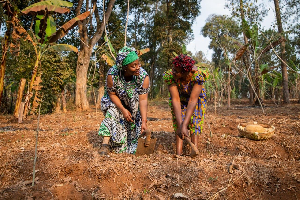Accra, July 16, GNA - Over 54 per cent of the total land area of Ghana is characterised by iron pan concretions that could have catastrophic effects on agriculture if nothing were done to check it. Out of Ghana's total land area of 238,537 squared kilometres, about 128,581 squared kilometres is currently susceptible to iron pan formations, scientist at the Centre for Scientific and Industrial Research (CSIR) said on Tuesday.
Iron pan is formed when minerals are leached through the soil during the rainy season and they are drawn back to the surface through capillary action in the dry season to form sheets of rock in the subsoil that prevent the penetration of water and roots of trees, thus exposing the surface to erosion by rain water and the laying bare of large area. Dr Rexford Dickson Asiamah, Director, Soil Research Institute of the CSIR, who made the disclosure said: "No clue has at yet been found to prevent the formation of the iron pan apart from ensuring a vegetative cover over the land the whole year round."
He was speaking in Accra at a national symposium and photo exhibition on environmental degradation under the theme: " Iron Pan in Ghanaian Soils: Problems and Prospects", organised by the Research Staff Association of the CSIR. "This is a national problem which can be found everywhere from the rainforest, through mountaintops, valleys to plains and it needs the involvement of all stakeholders to ensure the availability of agricultural lands for generations yet unborn," he said. More
Ms Theresa Tagoe, Deputy Minister of Lands and Forestry called on the scientists to break away from the scientific language and come to the level of farmers, foresters, landowners, the developers and all land users to enable them to understand the problem at stake and how to find solutions to it.
"The challenge is not merely finding academic and laboratory solutions, but solutions that are practical, that work, and methods that our local farmers and other land users can readily understand and apply as well as technologies that are easy to use and are affordable," she said.
Mrs Cecilia Bannerman, Minister of Mines, said it was important that the Mining Sector collaborated with soil scientists to identify better ways in which iron pan formations in mined -out areas could be prevented.
"In line with government policy to minimize environmental degradation, the current regulation is that surface mining is done portion by portion so that each portion is reclaimed immediately after it has been mined, while each successive portion is being exploited," Mrs Bannerman said.
She said the Ministry's worry was the illegal miners, whose irresponsible practices, resulted in excessive degradation of the environment adding: "We are exploring ways of dealing with the problem".
Dr Matthew Kweku Antwi, Deputy Minister of Environment and Science, urged the scientists to find out the benefit to which the hardened soils could be put so that in the end, a national catastrophe could become a blessing.
General News of Wednesday, 16 July 2003
Source: GNA












